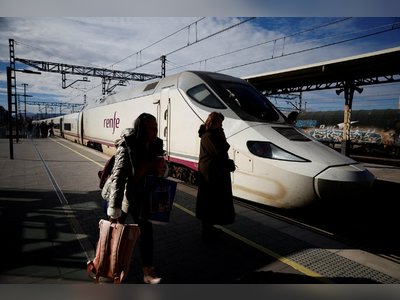
Irish and Czech Voters Cast Ballots Ahead of EU-Wide Elections: Migration, Far-Right Surge, and Geopolitical Tensions
In the EU's advance elections on Friday, Ireland and Czech Republic held votes.
Irish Prime Minister Simon Harris campaigned for local and EU elections, but some voters, like Keith O'Reilly, a 41-year-old IT worker, did not plan to support his center-right Fine Gael party.
In Czech Republic, voters were also concerned about migration and countering the far-right.
Surveys suggest gains for anti-immigrant populists in the upcoming Sunday elections when most EU nations will vote.
The Dutch far-right had a strong showing on the first day, but no decisive victory.
A Finnish man living in Ireland expressed concern about the country's anti-immigration political candidates and the rise of far-right groups.
With around 20% of Ireland's population being born outside the country and record levels of asylum seekers, some candidates are running on anti-immigration platforms.
Trevor Gardiner, a 42-year-old finance worker, and Emily, a 21-year-old first-time voter, shared their worries about the normalization of anti-immigrant rhetoric in Ireland.
The EU elections are taking place during geopolitical instability caused by Russia's war on Ukraine.
The far-right parties are capitalizing on the bloc's 370 million voters' fatigue from crises like the Covid pandemic and Moscow's invasion.
In the Netherlands, the Freedom Party of Geert Wilders made gains, but the Green-left alliance unexpectedly took first place.
This result could give hope to centrists trying to maintain their majority.
Eurasia Group's managing director, Mujtaba Rahman, predicts that the center will mostly prevail even if the far right secures a quarter of the EU's parliament seats.
The EU is experiencing a perceived surge in far-right politics, but the situation in the Czech Republic is more apathetic.
In the 2019 EU vote, the Czech Republic had the second-lowest turnout at 28.72%.
The centrist ANO movement, led by billionaire former prime minister Andrej Babis, is expected to win.
Voters, like Marek Cerveny, a teacher, view EU decisions as impacting their daily lives, including purchasing power, travel, and quality of living.
A 72-year-old economist named Vera Zazvorkova expressed her intention to vote for change in the European Parliament elections, advocating for fewer EU rules on the environment and stricter immigration policies.
The prospect of a rightward shift in the parliament has alarmed the conservative European People's Party (EPP) and the leftist Socialists and Democrats, who are expected to be the two largest blocs.
Current European Commission chief Ursula von der Leyen, of the EPP, may need support from the far right to secure a second term and has been courting Italian Prime Minister Giorgia Meloni, who leads the post-fascist Brothers of Italy party.
Over the weekend, focus will move to larger European economies for elections.
In France, Marine Le Pen's National Rally is expected to win.
Italy votes on Saturday, with Meloni's party predicted to lead.
Hungary's Fidesz, led by Prime Minister Viktor Orban, is also forecasted to do well.
In Germany, the far-right AfD is currently in second place behind the opposition conservatives.
In Czech Republic, voters were also concerned about migration and countering the far-right.
Surveys suggest gains for anti-immigrant populists in the upcoming Sunday elections when most EU nations will vote.
The Dutch far-right had a strong showing on the first day, but no decisive victory.
A Finnish man living in Ireland expressed concern about the country's anti-immigration political candidates and the rise of far-right groups.
With around 20% of Ireland's population being born outside the country and record levels of asylum seekers, some candidates are running on anti-immigration platforms.
Trevor Gardiner, a 42-year-old finance worker, and Emily, a 21-year-old first-time voter, shared their worries about the normalization of anti-immigrant rhetoric in Ireland.
The EU elections are taking place during geopolitical instability caused by Russia's war on Ukraine.
The far-right parties are capitalizing on the bloc's 370 million voters' fatigue from crises like the Covid pandemic and Moscow's invasion.
In the Netherlands, the Freedom Party of Geert Wilders made gains, but the Green-left alliance unexpectedly took first place.
This result could give hope to centrists trying to maintain their majority.
Eurasia Group's managing director, Mujtaba Rahman, predicts that the center will mostly prevail even if the far right secures a quarter of the EU's parliament seats.
The EU is experiencing a perceived surge in far-right politics, but the situation in the Czech Republic is more apathetic.
In the 2019 EU vote, the Czech Republic had the second-lowest turnout at 28.72%.
The centrist ANO movement, led by billionaire former prime minister Andrej Babis, is expected to win.
Voters, like Marek Cerveny, a teacher, view EU decisions as impacting their daily lives, including purchasing power, travel, and quality of living.
A 72-year-old economist named Vera Zazvorkova expressed her intention to vote for change in the European Parliament elections, advocating for fewer EU rules on the environment and stricter immigration policies.
The prospect of a rightward shift in the parliament has alarmed the conservative European People's Party (EPP) and the leftist Socialists and Democrats, who are expected to be the two largest blocs.
Current European Commission chief Ursula von der Leyen, of the EPP, may need support from the far right to secure a second term and has been courting Italian Prime Minister Giorgia Meloni, who leads the post-fascist Brothers of Italy party.
Over the weekend, focus will move to larger European economies for elections.
In France, Marine Le Pen's National Rally is expected to win.
Italy votes on Saturday, with Meloni's party predicted to lead.
Hungary's Fidesz, led by Prime Minister Viktor Orban, is also forecasted to do well.
In Germany, the far-right AfD is currently in second place behind the opposition conservatives.
Translation:
Translated by AI











